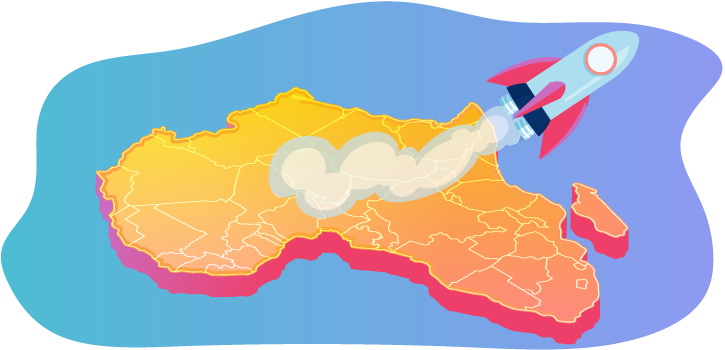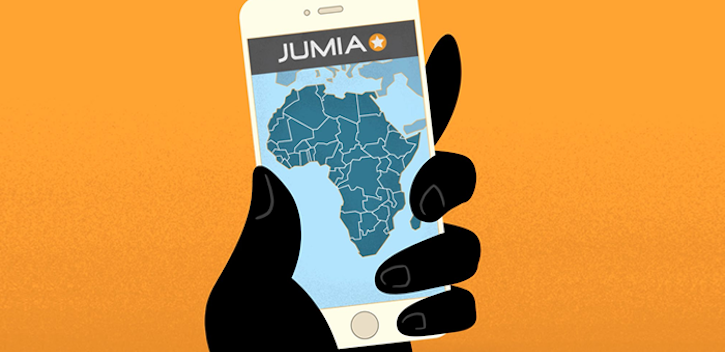The 2-billion-dollar mark has been exceeded: in 2019, African start-ups working in various fields including FinTech, e-commerce and InsurTech raised 2.02 billion dollars in equity according to the new report from the venture capital fund Partech Africa. With more and more start-ups working for a better world being produced by the continent’s entrepreneurial circles, this landmark achievement comes as no surprise.
Many more start-ups have recently managed to raise funds (150 in 2018 versus 234 in 2019). As things stand, 85% of funds are in 4 countries – Kenya, South Africa, Egypt and Nigeria. The latter has received an incredible 37% of the total investment. However, other African countries are also getting in on the act!
This article will introduce you to a selection of the most promising start-ups emerging on the continent.
Going international: 52 concepts you need to understand in order to succeed
Paga: the African start-ups for easy payment
Founded in 2009 by Tayo Oviosu and Jay Alabraba, Paga is a Nigerian start-up with a mobile payment app that allows people to transfer money, settle bills and pay for purchases at brick-and-mortar stores. It has over 14 million users in Nigeria.
The advantage of the app is that it’s not limited to the Nigerian market. Mindful of exporting to other countries, the business has acquired the Ethiopian company Apposit – a clever move as Ethiopia currently has the second biggest population in Africa (109.2 million people). Paga has also opened an office in Mexico in a bid to launch its service there and keep up the momentum. Its current goal is to become a leading FinTech platform for emerging countries, knowing that this is THE best-funded sector in African tech (receiving 41.3% of the continent’s investment in 2019 according to Partech Africa).
Thanks to its development, Paga has also caught the attention of Visa, which is interested in gaining ground and reaching out to high-potential start-ups in Africa. Meanwhile, its competitor Mastercard has invested 50 million dollars in Jumia (the African online sales leader) in a bid to develop financial services.
Brimore: to the Pyramids of Giza
Brimore is an Egyptian start-up that was founded in 2017 by Mohamed Abdulaziz and Ahmed Sheikha. It aims to link up individual distributors with small- and medium-sized businesses seeking a simpler way to have their products transported.
Manufacturers can sell their products using various different channels that work well thanks to the independent distributors.
Clients can access a wide range of exclusive high-quality products at affordable prices and without extra charges.
Partners can create their own companies and use their networks to sell manufacturers’ products.
In a country where currency devaluation led to instances of inflation in 2016, logistics has become a real development challenge, particularly when it comes to corporate services.
Brimore is hoping to become the leading middleman between manufacturers and consumers. The social commerce platform seems to have started off on the right foot, raising 3.5 million dollars in 2020 to support its growth and infrastructure. Brimore is developing world-class technology for its local market.
Jumo: the FinTech business facilitating lending
Jumo is a South African start-up that was founded by entrepreneur Andrew Watkins-Ball in 2015 and has managed to surf the mobile telephony wave. It’s important to note that while 80% of African people don’t have a bank account, the same percentage do have a mobile phone. Jumo has capitalised on this situation, offering various services like loans, insurance and other financial products to anyone outside the traditional banking system.
This start-up also supports early-stage businesses that can’t access bank finance as they develop. It’s difficult or impossible for young entrepreneurs to secure finance without a guarantee. This is where Jumo comes in!
In 2020, the business has received 55 million dollars in debt and equity funding. Thanks to these funds, it can proceed with its expansion and launch new financial products in Africa, specifically in Nigeria and Côte d’Ivoire, as well as in Asia, namely in India. It already received 3 million dollars‘ worth of funding in 2018 from Proparco, a subsidiary of Agence Française de Développement (AFD) – the subsidiary’s first direct FinTech investment.
Just like several other FinTech businesses, the South African start-up has positioned itself as an alternative to the many existing financial players. It is also working with high-end financial partners including Mastercard, Proparco and Google. The future looks bright!
Zafree Papers: it’s off to Ethiopia
Let’s begin with the etymology. “Zaf” means “tree” in Ethiopian, and we know the meaning of “free” in English. Put them together, and you get “Zafree”: a start-up founded in 2017 by Bethelhem Dejene and Fikre Dejene. This business sells 100% tree-free paper made from agricultural waste. Rather than wood, Zafree uses wheat and barley. This prevents the materials combusting, which could create air pollution.
The Zafree journey began thanks to a machine manufacturer and a local bank deciding there were enough technical and financial feasibility guarantees in place to establish partnerships and launch the start-up concept.
Environmental concern, specifically combatting deforestation, is the driving force behind Zafree. The marketing campaign is set to begin in 2021. This is one to watch…
Baobab Circle: better chronic-condition management
Founded in January 2016 in Kenya by George Franklin and Precious Lunga, Baobab Circle has created a chatbot known as Afya Pap. With access to healthcare quite limited in Africa, especially for disadvantaged individuals, the start-up markets itself as a “health coach” for those with chronic conditions like high blood pressure and diabetes.
Its main aim is to reduce patients’ suffering and change their everyday habits and it uses artificial intelligence and mobile telephony to provide custom equipment for managing high blood pressure and diabetes to avoid potential complications.
Baobab Circle currently has 50,000 users. It also won the 2019 Sanofi Diabetes Innovation Challenge during AfricArena, which will give the start-up the chance to develop a concept with the pharmaceutical group. Baobab Circle is now collaborating with 6 insurance/health organisations.
Yobante Express: formalising parcel transport
Created in 2018 by Oumar Basse, Yobante Express is a Senegalese-origin e-commerce marketplace which links up a large network of hauliers or pick-up points with local businesses. It specialises in delivering small parcels weighing under 25 kg. The service is available via an app and covers various countries: Senegal, Ghana, South Africa, Botswana, Niger and Nigeria.
The start-up’s advantage is that it offers an affordable and quick delivery service. With access to existing parcel routes, the sender pays 40% less than they would do conventionally.
Yobante Express has 611 pick-up points and 300 hauliers, has completed 8000 deliveries and has made around 50,000 dollars a month since its launch. And this is just the beginning…
Keitas Systems: welcome to Guinea
Although Keitas Systems was founded in Nantes, France and mainly operates in Europe, the start-up was created in 2011 by Lahou Keita – an African female entrepreneur from Guinea who was the world’s first Black woman to join Dassault and create an aeronautical maintenance company. With support from her sister Fatou Keita (a medical doctor and now co-founder), Lahou Keita managed to establish an aeronautics hub to combat the lack of technical workers available. She also created Tempeus – a tool for tracking maintenance when an aircraft is being worked on.
Keitas Systems is now undertaking a range of international aeronautics projects. The start-up was selected by Quebec’s government to open an aeronautics hub for Quebec City and for Quebec as a whole.
As we have seen, African Tech is flourishing and the digital sector is brimming with opportunities and start-ups with high technological added value. It’s worth keeping an eye on progress: this is just the start of a long journey for these early-stage African businesses!







